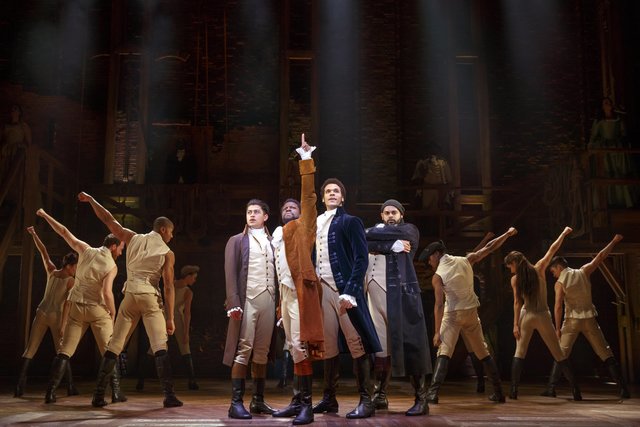Born into a society coming off a bloody, soul-crushing war nobody asked for. The folks who govern are taxing their people into oblivion; the common man looked at as a lesser caste, an undeserving people whose only purpose is to serve the whims of those born on third base.

What do the people do but revolt?
What do the people do but speak loudly enough to be heard by their oppressors and by those who would join the people’s cause to help it blossom? What do they do but change the landscape of the world they always knew, repositioning themselves from downtrodden to a juggernaut of world influence?
Question: Am I talking about the American Revolution or the birth of hip-hop?
Hamilton uses hip-hop to great effect. The show relies on the clever back and forth; the metaphors and musical cues hip-hop favors, to communicate its narrative to audiences. Even specific lyrics make callbacks to musical acts like Mobb Deep, Notorious B.I.G, or LL Cool J. It’s certainly no surprise the two would be so interconnected; the story of the American Revolution IS the story of hip-hop.
Rebellions are born on the streets, born from those disenfranchised by their “betters.” Rebellions are slapped together with whatever is at hand—in the American Revolution, it was a ragtag group of veterans and children with old guns and no training, in the hip-hop movement, a group of veterans and children creating music without instruments, finding their voice by repurposing the music that came before them.
Even more; the American Revolution succeeded with help from the rich and powerful—outside parties interested in 13 colonies no longer under the English monarchy. Similarly, the cash infusion hip-hop saw through the mid-1980’s and 1990’s bringing the urban musical revolution into the suburbs and the rest of America proper— was driven by those who stood to gain from those revolting.
Did I just blow you all away?
It’s telling that England’s musical landscape is represented by a British Invasion sound—the US music scene was defined by the British Invasion sound for decades prior to the birth of hip-hop. The choice makes an obvious parallel as Western civilization—defined by its European-centric imperialist roots—gave way to an early capitalist-model American movement. The spirit of ‘hustle’ as defined by hip-hop (and American exceptionalism) would overtake societal culture in a way that hadn’t been seen before.
“The story of the American Revolution IS the story of hip-hop”
It would be remiss of me to leave out the People of Color (POC) root of America. Hamilton may bend race with certain characters, but it certainly does more to account for the presence of POC at the birth of these United States than any piece of theater before it. To use hip-hop, a musical medium literally defined by its direct link to POC is perfect; especially because the preceding musical movement, rock and roll, had been whitewashed by society, not unlike the history of the US. The show itself, a treatise on liberty as we see it and as we’ve been taught, also makes the point that the revolution doesn’t culminate in true freedom. Slavery existed long after the revolution ended and hip-hop—itself a result of small, continual strides towards equality—only furthers the message that America still struggles with attaining true liberty.
Ultimately, there’s the thread of America’s scrappiness—that undiluted potential to reach unknown heights with only one’s passion to aid them, a goal at best unrealistic and broad, but a quintessentially American myth. We almost pride ourselves on a malleable history and there’s danger in going too far, but Hamilton stands as one of those rare efforts where finding the parallels in different times of American history and using those aspects to engage audiences, capture the curiosity of a new generation, and elicit thought, can serve to uplift instead of merely entertain. Hamilton celebrates the idea of America as a place where all can aspire to live in freedom—the only place where a cultural movement like hip-hop could possibly be born.




